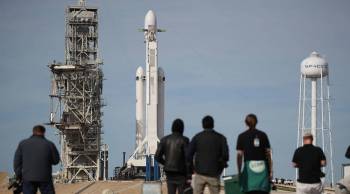Rocket may not find space in budget
TEXT OF STORY
KAI RYSSDAL: The White House is set to release its FY 2011 budget plan bright and early Monday morning. Obviously, various and sundry government agencies are hoping to protect their particular piece of turf. NASA is worried about the skies. The president is expected to kill the plan his predecessor came up with to put Americans back on the moon. Thousands of high-tech jobs hang in the balance, as does the business model for U.S. space policy.
From KUER in Salt Lake City, Jenny Brundin reports.
Jenny Brundin: Last fall, the future of the nation’s space policy seemed clear. Sure, the space shuttle program was ending. But there was a new plan in place. Not just to get astronauts up to the International Space Station, but to send them to back to the moon and beyond.
Man: T-minus 10, 9, 8…
That plan relied on a new rocket called the Ares I. Its test launch at the Kennedy Space Center in October was a success.
Sound of rocket blast off
Man: Ignition and lift off of Ares 1-X.
So far, NASA has sunk about $3.5 billion into Ares. Thousands of NASA employees and private contractors work on the rocket in states like Florida, Ohio and California.
NASA engineer: Now passing mach 2. Vehicle now 10 miles altitude.
But as the recession drags on, it seems NASA won’t get the billions it needs to complete the project. President Obama will scrap the plan to send Americans to the moon and Ares could be abandoned.
That’s bad news for aerospace company ATK, one of Utah’s largest employers. It builds the boosters for the Ares 1 rocket. ATK spokesman George Torres says future jobs at the company depend on the President’s vision for space exploration.
George Torres: It comes down to, Are we going to stay in lower Earth orbit, which is the space station, or are we going to do true exploration — which could be Mars or an asteroid or the moon, or any number of things.
The President’s budget is expected to reveal a new strategy, one that relies on private companies to send cargo and astronauts to the International Space Station.
Jeff Greason: When NASA tries to be an operator of transportation services, they’re not playing to their strengths.
Jeff Greason is president and CEO of XCOR Aerospace and a member of the panel that advised Obama on the future of American space flight. He thinks using private companies for shorter flights will free up NASA to focus on deep space research.
Greason: We are opening up or should be opening up new frontiers for humanity. And you don’t do that going around and around in lower orbit. That’s not the same as exploration.
No companies have launched their space craft into orbit yet. Several say they’ll be ready soon, like SpaceX, owned by the multi-millionaire founder of PayPal. But NASA backers ask this question: What if the U.S. abandons the Ares rocket, and private companies can’t launch their space crafts successfully? Utah Congressman Rob Bishop says it could damage the nation’s aerospace industry for decades to come.
Rob Bishop: The problem is, there are a lot of people who think of these jobs are simply like a spigot you can turn on and off. Once you cut the production lines, the engineers and the technical people leave and you cannot just simply bring them all back.
Bishop hopes Obama’s budget doesn’t signal the final frontier just yet. Any shift in NASA’s mission is likely to face stiff opposition from Congress.
From Salt Lake City, I’m Jenny Brundin, for Marketplace.
There’s a lot happening in the world. Through it all, Marketplace is here for you.
You rely on Marketplace to break down the world’s events and tell you how it affects you in a fact-based, approachable way. We rely on your financial support to keep making that possible.
Your donation today powers the independent journalism that you rely on. For just $5/month, you can help sustain Marketplace so we can keep reporting on the things that matter to you.


















